Over 30 years of anarchist writing from Ireland listed under hundreds of topics
Review
Preface to the 1st edition (1983) by Daniel Guerin
George Fontenis' study seems useful to me, indeed I would go so far as to say it is valuable, not only as it teaches a better understanding of the Spanish Revolution of 1936-7 but it also provides a more extensive interpretation of the notion of libertarian communism itself.
Moments of Excess; Movements, Protest and Everyday Life - Review:
 In November 1999 a new cycle of struggles burst into the media consciousness of the world with the spectacle of anti-WTO protesters confronting police in the streets of Seattle. In fact this was a cycle that had first raised its head in England earlier that year when astonished TV viewers turned on the news on June 18th to discover that the City of London was under siege by ‘anti-capitalist’ protestors, the first time that term had ever been heard in media reporting. ‘Moments of Excess’ is a collection of texts by the Free Association written from 2001 to 2011 paralleling this cycle of struggles, of the so-called anti-globalisation or counter-globalisation movement with its succession of counter-summit mobilisations from Seattle, Prague, Genoa, Evian, Gleneagles and Heiligendamm amongst others.
In November 1999 a new cycle of struggles burst into the media consciousness of the world with the spectacle of anti-WTO protesters confronting police in the streets of Seattle. In fact this was a cycle that had first raised its head in England earlier that year when astonished TV viewers turned on the news on June 18th to discover that the City of London was under siege by ‘anti-capitalist’ protestors, the first time that term had ever been heard in media reporting. ‘Moments of Excess’ is a collection of texts by the Free Association written from 2001 to 2011 paralleling this cycle of struggles, of the so-called anti-globalisation or counter-globalisation movement with its succession of counter-summit mobilisations from Seattle, Prague, Genoa, Evian, Gleneagles and Heiligendamm amongst others.
VIDEOCRACY: Broadcasting Control over the Italian Psyche - review
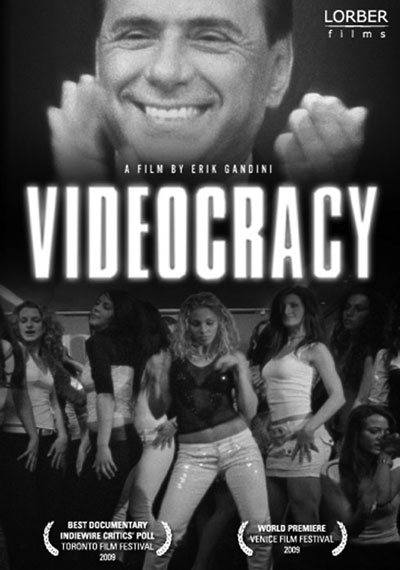 Erik Gandini’s “Videocracy” is an intriguing and distressing documentary film that explores Silvio Berlusconi’s media empire, and the deep impact that it has had on Italian society and culture. Gandini’s investigative endeavour was released in 2009, but the trailers were blocked on the six main Italian television channels, which are controlled by Berlusconi. It was a tacit form of censorship aimed at obstructing Videocracy’s popularity, the alleged reason for doing so being that it was offensive to Berlusconi’s reputation. This backfired completely as the block created mass-hype about the film, and when it was screened at the Venice Film Festival it was received by a huge audience and accolades.
Erik Gandini’s “Videocracy” is an intriguing and distressing documentary film that explores Silvio Berlusconi’s media empire, and the deep impact that it has had on Italian society and culture. Gandini’s investigative endeavour was released in 2009, but the trailers were blocked on the six main Italian television channels, which are controlled by Berlusconi. It was a tacit form of censorship aimed at obstructing Videocracy’s popularity, the alleged reason for doing so being that it was offensive to Berlusconi’s reputation. This backfired completely as the block created mass-hype about the film, and when it was screened at the Venice Film Festival it was received by a huge audience and accolades.
Review: The Kronstadt Rebellion, Still Significant 90 Years on
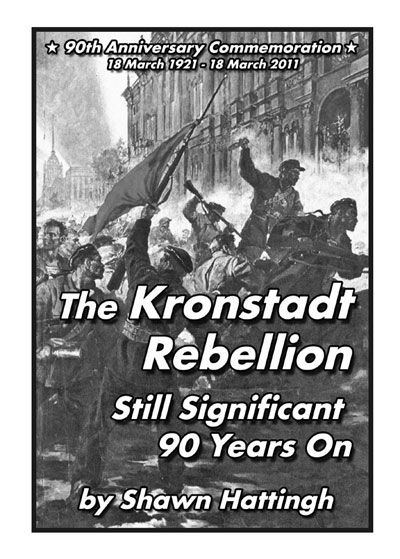 Zabalaza Books, the anarchist printing project linked to the Zabalaza Anarchist Communist Front (ZACF) in South Africa, recently produced this pamphlet to commemorate the Kronstadt uprising in March 1921, when the sailors and workers of the Kronstadt naval base rose up against the Bolsheviks and were slaughtered by the dictatorship.
Zabalaza Books, the anarchist printing project linked to the Zabalaza Anarchist Communist Front (ZACF) in South Africa, recently produced this pamphlet to commemorate the Kronstadt uprising in March 1921, when the sailors and workers of the Kronstadt naval base rose up against the Bolsheviks and were slaughtered by the dictatorship.
Review: Springtime, the New Student Rebellions
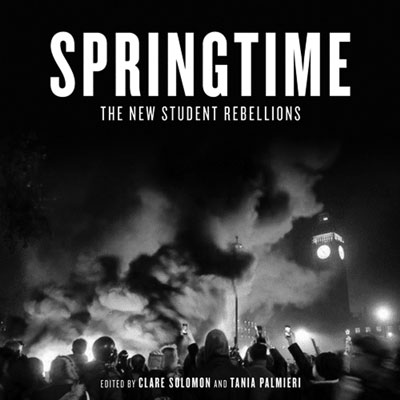 The autumn and winter of 2010 saw the sudden and dramatic re-emergence of radical student movements, with mass student uprisings taking place across Europe and the United States in opposition to both the austerity measures being levelled against ordinary people as a result of the crisis in capitalism, and the neoliberal restructuring of education according to the needs of capital. Across the Western world, governments are introducing measures to transform universities into “factories of precarious workers” - institutions devoted to the production of graduates equipped with the skills and ideas desired by industries increasingly reliant on immaterial and mental labour, turning ideas into profits. These employees must be willing to work in increasingly precarious situations, either entirely unpaid, or for increasingly low wages on increasingly short-terms contracts – a transformation that is increasingly meeting resistance from both students and academic staff, and which has only accelerated since the present crisis began. Meanwhile, in the Arab world, students have played a key role in the mass uprisings to topple Western-backed thugs such as Zine Ben Ali and Hosni Mubarak.
The autumn and winter of 2010 saw the sudden and dramatic re-emergence of radical student movements, with mass student uprisings taking place across Europe and the United States in opposition to both the austerity measures being levelled against ordinary people as a result of the crisis in capitalism, and the neoliberal restructuring of education according to the needs of capital. Across the Western world, governments are introducing measures to transform universities into “factories of precarious workers” - institutions devoted to the production of graduates equipped with the skills and ideas desired by industries increasingly reliant on immaterial and mental labour, turning ideas into profits. These employees must be willing to work in increasingly precarious situations, either entirely unpaid, or for increasingly low wages on increasingly short-terms contracts – a transformation that is increasingly meeting resistance from both students and academic staff, and which has only accelerated since the present crisis began. Meanwhile, in the Arab world, students have played a key role in the mass uprisings to topple Western-backed thugs such as Zine Ben Ali and Hosni Mubarak.
Review of Irish Election 2011 - When the Joke's over?
 Tragedy dressed as comedy, that’s what I am going to remember from this election. It's funny to watch Fine Gael part with huge sums of money to some clever marketing interweb company under the title of 'social viral advertising' only to be presented with a game on their website where Enda Kenny runs around like a grinning ninja rat despatching opponents with the Fine Gael stars and the catch phrase ‘On your bike’, picking up token votes along the way.
Tragedy dressed as comedy, that’s what I am going to remember from this election. It's funny to watch Fine Gael part with huge sums of money to some clever marketing interweb company under the title of 'social viral advertising' only to be presented with a game on their website where Enda Kenny runs around like a grinning ninja rat despatching opponents with the Fine Gael stars and the catch phrase ‘On your bike’, picking up token votes along the way.
Review: The Pipe
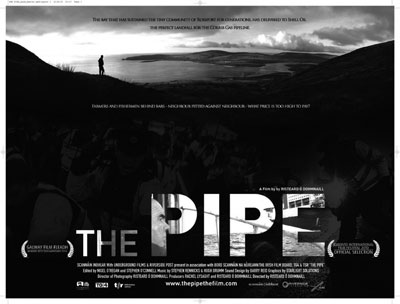 This film brings to the big screen the dramatic story of Shell’s blundering, sometimes violent, attempts to impose a high-pressure raw gas pipeline on a small North Mayo community. The documentary features footage taken over three years, from 2006 to 2008, by Risteard O’Domhnaill. It has all the ingredients, stunning landscapes, riveting action scenes and the real-life stories of local people who found themselves on the front line of the drama. The film is short on background to the whole issue and mentions very little on the actual dangers posed by the pipeline and refinery, as well as the giveaway terms the oil companies ‘extracted’ from Irish state. However, in Willie Corduff, and particularly in Pat O’Donnell, the filmmaker has struck cinema gold. Through the words and, especially, the actions of these figures we get a good picture of just what’s at stake here and what it takes to engage in effective resistance.
This film brings to the big screen the dramatic story of Shell’s blundering, sometimes violent, attempts to impose a high-pressure raw gas pipeline on a small North Mayo community. The documentary features footage taken over three years, from 2006 to 2008, by Risteard O’Domhnaill. It has all the ingredients, stunning landscapes, riveting action scenes and the real-life stories of local people who found themselves on the front line of the drama. The film is short on background to the whole issue and mentions very little on the actual dangers posed by the pipeline and refinery, as well as the giveaway terms the oil companies ‘extracted’ from Irish state. However, in Willie Corduff, and particularly in Pat O’Donnell, the filmmaker has struck cinema gold. Through the words and, especially, the actions of these figures we get a good picture of just what’s at stake here and what it takes to engage in effective resistance.
Black Flame and the anarchist tradition - review
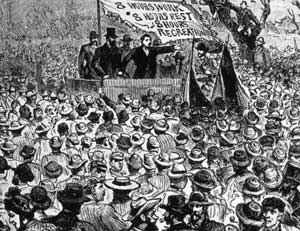 This new history of anarchism provides a thorough and approachable examination of the tradition’s key ideas, debates and strategies, placing them in the context of the social struggles in which they arose. Anarchism is not blessed with the most attractive of brand names. While dictionaries and news media alike have successfully associated it with disorder and chaos, the anarchist political pantheon itself seems to share these traits; anarchism is label to both capitalists and communists, radical individualists and revolutionary socialists.What can ‘anarcho-capitalists’ such as Murray Rothbard have in common with revolutionaries such as Mikhail Bakunin and Piotr Kropotkin? Even the latter, among the most important of the movement’s theorists, himself claimed that anarchism’s political pedigree stretched back as far as Ancient Greek philosopher Xeno and Lao Tzu, the originator of Taoism. If one tries to and accommodate such a diversity of personas under this single term, the word loses all meaning.
This new history of anarchism provides a thorough and approachable examination of the tradition’s key ideas, debates and strategies, placing them in the context of the social struggles in which they arose. Anarchism is not blessed with the most attractive of brand names. While dictionaries and news media alike have successfully associated it with disorder and chaos, the anarchist political pantheon itself seems to share these traits; anarchism is label to both capitalists and communists, radical individualists and revolutionary socialists.What can ‘anarcho-capitalists’ such as Murray Rothbard have in common with revolutionaries such as Mikhail Bakunin and Piotr Kropotkin? Even the latter, among the most important of the movement’s theorists, himself claimed that anarchism’s political pedigree stretched back as far as Ancient Greek philosopher Xeno and Lao Tzu, the originator of Taoism. If one tries to and accommodate such a diversity of personas under this single term, the word loses all meaning.
The scientific case against inequality - review of The Spirit Level
 We all want a better world, but is it possible? The recently published book The Spirit Level joins a growing body of evidence for the viability of a better world.
We all want a better world, but is it possible? The recently published book The Spirit Level joins a growing body of evidence for the viability of a better world.
Mayday 2004 and why we still need to resist the EU project
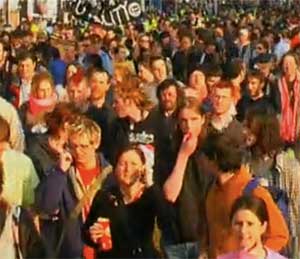 With the European Central Bank in partnership with the IMF taking over the running of Ireland's economic policy and hence social policy for the next few years we thought it timely to revisit the weekend of Mayday 2004 when Dublin saw major protests against the EU summit and the neo-liberal policies that were being adopted. This is not an article about how “right” anarchist were about the EU, but we thought it timely to remind people of the biggest, openly organised weekend of protest against hierarchy, power and capitalism Ireland has so far seen. It includes a 30 minute documentary that shows the highlights of the weekend that we think has not yet been put online.
With the European Central Bank in partnership with the IMF taking over the running of Ireland's economic policy and hence social policy for the next few years we thought it timely to revisit the weekend of Mayday 2004 when Dublin saw major protests against the EU summit and the neo-liberal policies that were being adopted. This is not an article about how “right” anarchist were about the EU, but we thought it timely to remind people of the biggest, openly organised weekend of protest against hierarchy, power and capitalism Ireland has so far seen. It includes a 30 minute documentary that shows the highlights of the weekend that we think has not yet been put online.

